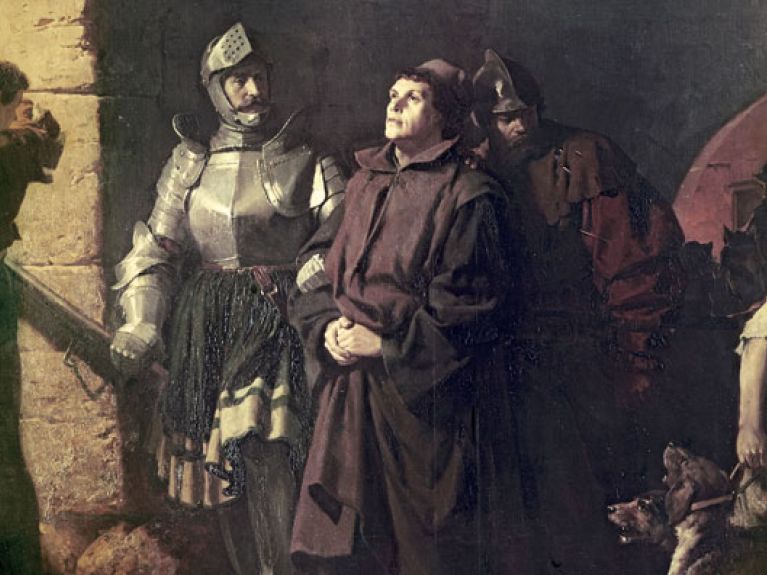Luther’s legacy – the Reformation 500 years on
The Reformation is one of the most far-reaching events in European history. Its impact and its initiators will be a subject of disscussion during the Reformation anniversary celebrations in 2017.

Five hundred years ago, changes began, mainly in the German-speaking part of Europe, that were to have a profound influence on world history. The divide came about within Christianity between the Protestant denominations and the Catholic Church. Individual freedom of conscience, the German language as we know it today and our presdent-day understanding of work also developed. What happened at that time is today known as the Reformation. It began as a theological dispute, mainly initiated by the young monk Martin Luther (1483–1546), who taught at the university that had only recently been founded in the small provincial town of Wittenberg. In October 1517 he sent out Ninety-Five Theses on theological questions that he wanted to debate in public – as was usual at that time. It is probably a legend, however, that Luther also nailed the Ninety-Five Theses to the door of All Saints’ Church in Wittenberg. In any event, his ideas provoked a dispute that, although it was never Luther’s intention, led to the division of the Church and, after his death, to the so-called European Wars of Religion between Protestant and Catholic princes, as well as the redrawing of the European map. Luther developed his own theology, later called Protestantism, which turned against the papacy and shifted the focus of attention onto individual faith. He left the Order of Saint Augustine, married, translated the Bible into German, wrote a large number of widely read works – and as a result founded what are now the Protestant churches. Today roughly 37% of the world’s 2.2 billion Christians belong to a Protestant denomination. In Germany, 29% of the population are Protestants and 30% Catholics, while 34% do not belong to a faith community.
Luther’s Ninety-Five Theses, written in Latin, became etched into cultural memory as the nailing of the theses to the church door in Wittenberg. In 2017, 500 years after this influential event, the anniversary of the Reformation is being celebrated worldwide, and especially in Germany, where there will be church- and government-organised events, commemorations, exhibitions and conferences. 31 October 2017 will also be a one-off nationwide public holiday. As a result, the anniversary of the Reformation be one of the largest jubilees ever. In 2008, the Evangelical Church in Germany (EKD) and the government inaugurated the Reformation Decade, which is focusing on the Reformation in a series of thematic years leading up to the anniversary itself.
At the same time, the Federal Government and several states established a Luther 2017 Project Office. The government side aims primarily to focus attention on the influences and achievements of the Reformation in the fields of art, culture, society and politics, to promote Germany internationally as the Land of the Reformation and to inform people about the legacy of the Reformation.
The Reformation is undoubtedly one of the most far-reaching events in German, European and world history. It has profoundly influenced the theological, historical, psychological and political self-image of Germany and Europe, and the West generally. It has had an impact not only on the German language, but also on music and art, provided major impulses in the field of education and created the foundations for social and political participation, as well as for active citizenship.
Without the Reformation the world would look very different in many areas – there is wide agreement on this. Thies Gundlach, Vice President of the Church Office at the EKD and the person responsible for the basic direction of the Reformation anniversary celebrations, also believes that today we again live “in our own form of pre-Reformation era”, one in which fundamental principles are being called into question. He considers Luther’s path from Augustinian monk to the discoverer of a freedom of belief without regard for institutional requirements to be an existential archetype of all liberation paths.
Yet, both historians and theologians agree that neither the Reformation nor Luther’s theology was merely a story of liberation. However, it is better not to invite historians to jubilee celebrations, because they can be depended upon to focus on the points in history that are hard to celebrate – from Luther’s anti-Semitic writings to the wars of religion. Naturally, these subjects will be discussed during the Reformation anniversary – incidentally, mainly on the initiative of the EKD itself. In the history of ideas, Luther had many harbingers who anticipated his thought; however, he was able to assert himself by applying courage and skill, by attracting attention throughout Europe, which he received thanks to the media revolution of printing, and by seizing the political moment. His ideas spread swiftly. Nevertheless, the history of the Reformation was intrinsicly contradictory and, like all historical processes, open: the Reformation did not end the Middle Ages, it emerged out of them. The Middle Ages were not “dark”; many of the ideas we consider modern today had already been formulated. To that extent, the Reformation represents the culmination of medieval ideas, not their overthrow. It is also not a history of Luther; Luther is a central, but not the only influential figure during the early Reformation.
It is therefore important to perceive the late Middle Ages as a time of enormous diversity, in the same way that the age of Reformation was itself diverse. Even the term “age of Reformation” is misleading: this was not simply the time of the Reformation, but also of the Renaissance. Luther’s contemporaries included other Reformers, such as Huldrych Zwingli and Johannes Calvin, to whom the EKD untiringly refers – and Renaissance giants like the artist Leonardo da Vinci and the historian and political theorist Machiavelli.
That is why there are no longer grounds for the thesis of decay with reference to the Catholic Church, which was only renewed by Luther. The whole history of the Reformation is closely bound up “with the many different forms of piety, theology and culture of the late Middle Ages”, according to the historian Thomas Kaufmann. There also continues to be argument among researchers about the Reformation’s place in history. It is disputed whether it should be described as an “unexpected, sudden break with the past” or as a “gradual transformation”. Meanwhile, however, there is consensus that there was not one single, self-contained Reformation, but many different Reformations. Here, according to Kaufmann, Luther especially came to be used by subsequent generations as a projection surface for “diverse longings, hopes, enmities and dreams”. However, he is – on this the experts are largely agreed – not an “exceptional figure”, but in many respects a “stranger” to us today, according to church historian Volker Leppin.
It is nevertheless true that Luther had and still has a strong historical influence. This is especially demonstrated by his understanding of (Christian) freedom. In his treatise “On the Freedom of a Christian”, which was published in 1520, he establishes the idea that a Christian is, on the one hand, a “free lord over all things and subject to no one” and, on the other, “a ministering servant to all things and subject to everyone”. With this thesis Luther made the consequential distinction between the “inner” and “outer” human being; it forms the basis for a Protestant theology that shifts faith into the centre of what it means to be a Christian: neither “works” nor “laws” nor even the Church – in other words, no “outer” factors – are crucial for (“inner”) salvation; only faith and God’s mercy can decide.
Luther’s concept of freedom is above all a theological one. But he was never only understood that way. The opinion emerged as early as the German Peasants’ War (1523–1526) that this understanding of freedom should be applied politically. Luther explicitly opposed this, but the idea of freedom as a rejection of subservience had an enormous impact. Luther’s Ninety-Five Theses were claimed by different sides and also misused as justification for national, social and political freedom. Luther did not discover modern freedom; he strengthened a dialectic that reveals liberty to be an ambivalent process.
There are many good reasons to remember the Reformation on the 500th anniversary of the “nailing of the Theses” – also because it represents an important cultural and intellectual transformation. The most important thing for theologian Ulrich Duchrow is that the Reformation has not yet come to an end. He attaches importance to a renewed Church “that embraces everyone – across the divides of religions, ethnicity, continents and self-interest”. This “postcolonial interpretation of Reformation theology” aims to respond explicitly to the here and now. That definitely comes close to Luther’s theological self-conception. Christianity meant above all one thing to him: “lived faith”. ▪

